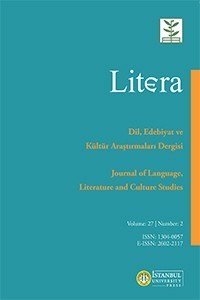The Confession of the Other: Mohsin Hamid’s The Reluctant Fundamentalist
The September 11th attacks on the U.S. caused unanticipated changes in the global arena. Their depiction in fictional discourse contributed to the broad understanding of the events and their memorialization. In this paper, I analyze Mohsin Hamid’s novel The Reluctant Fundamentalist which presents the perspective of those who were silenced in the dominant rhetoric of the 9/11 tragedy and were single-mindedly blamed as “evil others.” Through his monologue, Changez, the homodiegetic narrator of the novel, explicitly demonstrates the intention to present the voice of the Other. The narrator of the novel asks readers to listen to the other side of the conflict and not to judge all Muslims as bloodthirsty fundamentalists. Changez proposes that the American agent consider his view in order not to blame him but to understand the roots of his anger. In addition to his appeal for constructive dialogue between the West and the East, the narrator of the novel brings forward the critical revision of the U.S.’ international politics. One of the messages is that after causing so much grief and misfortune abroad, the U.S. cannot play the role of an innocent observer. I conclude that the diegesis of the novel opens new ways for productive dialogue between nations and countries.
Keywords:
national identity and globalization, Mohsin Hamid, The Reluctant Fundamentalist, The Reluctant Fundamentalist, post-9/11 fiction dialogue between the West and the East,
___
- Altheide, D. (2010). Fear, Terrorism, and Popular Culture. In J. Birkenstein, A. Froula, & K. Randell (Eds.), Reframing 9/11 Film, Popular Culture and the “War on Terror”(pp.11 - 23). New York: Continuum. google scholar
- Borradori, G. (Ed.). (2003). Philosophy in a Time of Terror: Dialogues with Jurgen Habermas and Jacques Derrida. Chicago: Chicago University Press. google scholar
- Cainkar L. (2009). Homeland Insecurity: The Arab American and Muslim American Experience After 9/11. Russell Sage Foundation. google scholar
- Croft St. (2006). Culture, Crisis and America’s War on Terror. Cambridge: Cambridge University Press. google scholar
- Dawes B. (2011). GroundZero Fiction: History, Memory, and Representation in the American 9/11 Novel. Heidelberg: Universitatsverlag Winter GmbH. google scholar
- DeLillo, D. (2001). In the Ruins of the Future. Harper’s Magazine, December. Retrieved August 2, 2019, from https://harpers.org/archive/2001/12/in-the-ruins-of-the-future/. google scholar
- Frank, M. (2020). The Novel After 9/11: From Ground Zero to the “War on Terror”. In S. Baumbach & B. Newmann (Eds.), New Approaches to the Twenty-First Century Anglophone Novel (pp. 175 - 94). Palgrave Macmillan. google scholar
- Gray R. (2011). After the Fall. American Literature since 9\11. Wiley- Blackwell. google scholar
- Hamid M. (2008). The Reluctant Fundamentalist. Boston, New York: A Mariner Book. google scholar
- Hardt, M., & Negri, A. (2000). Empire. Harvard University Press. google scholar
- Harvey D. (2003). The New Imperialism. Oxford University Press. google scholar
- Kellner, D. (2004). 9/11, spectacles of terror, and media manipulation. Critical Discourse Studies, 1(1), 41-64. google scholar
- Massumi, B. (2010). The Political Ontology of Threat. In M. Gregg & Gr. Seigworth (Eds.), The Affect Theory Reader (pp.52 - 70). Duke University Press. google scholar
- Tuan, Yi-Fu. (2001). Space and Place. The Perspective of Experience. Minneapolis: University of Minnesota Press. google scholar
- Shymchyshyn, M. (2020). The Janissaries of the 20th century: Mohsin Hamid’s Novel The Reluctant Fundamentalist. google scholar
- Literary Process: Methodology, Names, Trends, 14, 54-61. Retrieved from https://litp.kubg.edu.ua/index.php/ journal/article/view/485. google scholar
- Wersching Gr. (2012). Rev. of Ground Zero Fiction: History, Memory, and Representation in the American 9 / 11Novel, by Birgit Dawes. Journal of American Studies. 46, 414. google scholar
- Başlangıç: 1954
- Yayıncı: İstanbul Üniversitesi
